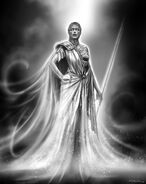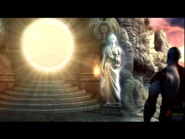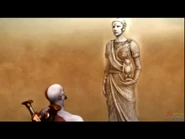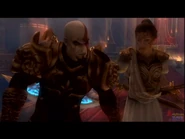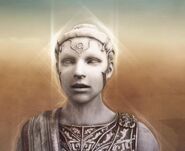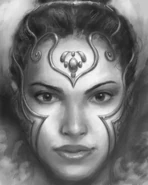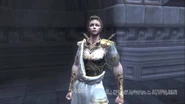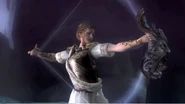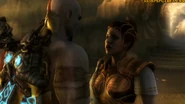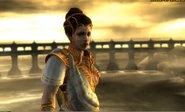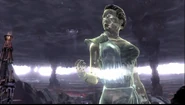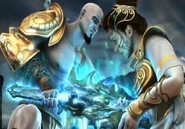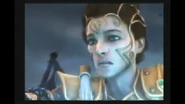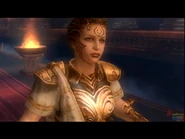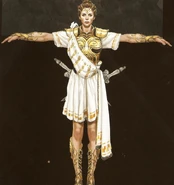| “ | Death cannot hold those with purpose, Kratos. | ” |
Template:Infobox gods
Athena was the Olympian Goddess of Wisdom and War, and the Deuteragonist of the God of War Series, who mostly appeared as an ally of Kratos.
She was seen as a neutral character in God of War II, and her place as Deuteragonist was taken by Orkos in God of War: Ascension and by Gaia in God of War II. In the middle stages of God of War III, after Gaia betrayed Kratos, Athena took her place back as the Deuteragonist and helped Kratos in ways that she could.
Greek Mythology
Athena (also pronounced Athene), also referred to as Pallas Athena (Παλλάς Αθηνά; pronounced /ˈpæləs/), was the Goddess of Civilization, Wisdom, War, Strategy, Craft, Justice, and Skill in Greek Mythology. Minerva, Athena's Roman incarnation, embodied similar attributes. Athena was also a shrewd companion of heroes and the Goddess of heroic endeavor. She was the virgin patron of Athens. The Athenians built the Parthenon on the Acropolis of her namesake city, Athens, in her honor (Athena Parthenos).
In the God of War Series
Hunting the Marked Warrior
Zeus, driven by fear after hearing the oracle's prophecy that the Olympian rule would end at the hands of a "Marked Warrior", sent Ares and Athena to capture the one believed to be the "Marked One": a Spartan boy named Deimos. His older brother, Kratos, tried to stop the two, but was easily swatted aside by the God of War. Before he could strike Kratos, Athena stopped Ares and told him they already had what they came for. Before she left, she gave one last look to the young Kratos and asked for forgiveness. That set in motion the prophecy, as they unknowingly picked the wrong Spartan youth; it was Kratos who would destroy everything that Mount Olympus stood for.
Siege of Athens
Out of utter hatred and jealousy towards Athena, Ares summoned monsters from the Underworld and attacked the city of Athens to prove his superiority over her to Zeus. Since Zeus had forbidden the Gods from battling each other directly, Ares himself led the attack on Athens and thought that nothing short of a fellow Olympian could hope to stop him. Athena and the other Gods sought to empower Kratos to save Athens and put an end to Ares' rampage once and for all. She guided him throughout the game to Pandora's Box.
After the death of Ares, she revealed that Kratos was forgiven of his sins, but the Gods never agreed to relieve him of his nightmares; no Mortal or God could ever forget the terrible things that he had done. With all hope lost, Kratos felt abandoned and flung himself from the Suicide Bluffs that overlooked the Aegean Sea and believed that death was his only escape from his madness. However, Athena saved Kratos from falling to his death. The Gods had not abandoned Kratos at all. Athena gave Kratos the throne of Ares and the title of God of War. She also granted him the Blades of Athena to replace the Blades of Chaos that were given to (and taken away from) him by Ares.
The new God of War
Kratos' Hunt for the Ambrosia
As Kratos made his way to the Ambrosia once again, Athena tried to warn him about the many dangers on the path to the Ambrosia. Kratos simply shrugged off her warnings however, and moved on. Kratos later encountered her again, and was told by the Goddess that it was the dead that he must fear. Further on, Kratos found the dead Spartan Soldiers whom he had abandoned many years ago. They returned from the dead and were ready to fight Kratos and kill him in anger and vengeance, but Kratos defeated them.
God of War: Ghost of Sparta
After the events of God of War, Kratos set out on a journey to find his mother, Callisto, an act which Athena tried to prevent. After the two debated on whether or not Kratos should abandon this quest, soldiers of Triton attacked the ship. After Kratos (reluctantly) defeated Callisto in battle, he proclaimed to Athena that the Gods had lied to him about his brother. After gaining no response to his proclamations, Athena finally answered, tried to warn Kratos, attempted to dissuade him, and begged for forgiveness. Kratos then realized that she was there when his brother was kidnapped years ago as she stated that there were reasons for it. Enraged by that revelation, Kratos destroyed the Statue which Athena had used to communicate with him.
After the death of both Deimos and Thanatos, Athena came out of a Portal, she told him that his ties to the Mortal World were severed and that he was ready to be a God. She then attempted to empower Kratos to full Godhood, but Kratos refused however, and swore that the Gods would pay for the pain that they had caused him and his family. After Kratos had left for Olympus, Athena begged for his forgiveness and even went so far as to silently acknowledge him as her brother.
Zeus' Betrayal
| “ | Enough, Kratos! With every city you destroy, the wrath of Olympus grows, soon I will no longer be able to protect you. | ” |
Unfortunately, Kratos was a far more ruthless God of War than Ares ever was. Shunned by his fellow Gods, and angry toward them for not ridding him of his nightmares (and the suffering his mother and brother went through), he turned to his Spartan Army. Together, they began to conquer all of Greece. Athena warned Kratos that if he did not stop his path of destruction, the wrath of Olympus would grow ever stronger and that she would not be able to protect him. Kratos disbelieved Athena, turned his back on her, and went to the island of Rhodes where his Spartan army had lain siege.
Athena was left with no other choice but to help rid Olympus of Kratos.
As a colossal God, Kratos tore apart the city of Rhodes until an eagle flew over him, drained much of his godly power, and shrunk him down to mortal size. At first, Kratos believed that it was Athena’s act of defiance against him, until it was actually revealed to be the King of the Gods himself – Zeus.
Speaking to Kratos
During Kratos’ journey through the Island of Creation, he came upon the Garden of the Gods, where a golden statue of Athena warned him not to listen to Gaia or the Titans (this warning would later prove to be justified during the events of God of War III). She soon explained to Kratos that there were more important things besides seeking revenge and that Zeus did what he had to in order to protect Olympus: The King of the Gods did in fact fear Kratos. However, Kratos ignored the warning, destroyed the statue, continued on his quest to the Sisters of Fate, and soon defeated them.
Death
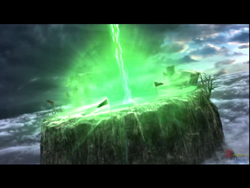
Athena's death in God of War II.
The warnings of Athena did not move Kratos, and he continued his path of vengeance until he faced Zeus once again. Taking the Blade of Olympus, Kratos stabbed Zeus with it repeatedly until Athena intervened. Angered by her interference, Kratos pushed her aside and struck at the fleeing Zeus. Athena threw herself in front of Zeus before he could be stabbed, and fell by Kratos’ hand. Saddened by what he had done, Kratos asked Athena why she would sacrifice herself. Athena replied that Zeus must live so that Olympus could prevail. She also revealed that Kratos was the child of Zeus, who was compelled to destroy his father just as Zeus had done to Cronos. Athena's revelation confirmed that Kratos was her brother and he was a Demigod. Sickened by that very fact and more vengeful than ever, Kratos claimed that he had no father and left Athena to die in a spectacular burst of green light. Kratos then proclaimed: "If all on Olympus will deny me my vengeance, then all on Olympus will die. I have lived in the shadow of the gods for long enough! THE TIME OF THE GODS HAS COME TO AN END!"
Beyond Death
| “ | I see truths where I did not before... | ” |
After he fell from Gaia's back during the Attack on Mount Olympus, Kratos wound up in the River Styx that led him into the Underworld. There, Athena, in a Ghost-Like State, appeared to Kratos, gave him the Blades of Exile and told him that in order for him to defeat Zeus, he had to venture back up the mountain and extinguish The Flame of Olympus, which he would find on the other side of Hera's Garden. Athena also informed Kratos about Pandora's Box, which he would find once he had reached the Flame. When a skeptical Kratos inquired as to her sudden change in heart, Athena explained that her death had brought about a change in her, an ascension to a level beyond that of the Gods, and how she understood more in that form than she did in the past. She stated that Zeus' death was necessary if humanity was ever to be freed, and would aid Kratos throughout his quest.
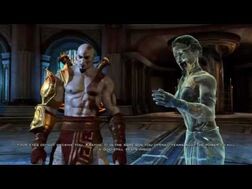
Athena aiding Kratos in Astral Form in God of War III.
After Kratos succeeded in killing Zeus, Athena stated that it was time that mankind heard her message and insisted that Kratos give the powers of the Box back to her. Kratos however, sneered at her sentiments and cited the fact that Chaos was ravaging the world and the fact that Pandora's Box was empty. Confused at first, Athena then realized that when Kratos opened the box to defeat Ares, it unleashed all the evils that Zeus had captured and infected the Gods. Instead of drawing on the evil powers within the box as she had once thought, Kratos had in fact acquired the power of Hope, the power that Athena herself had sealed in the box, should it ever be opened again. During all that time, however, Kratos had that power buried underneath all his anger, sorrow, and guilt, and thus shielded it from everyone, including himself.
Athena insisted again that Kratos return the power of Hope to her, in order to restore the world and rule it as the new Queen of Olympus. Kratos instead decided to impale himself with the Blade of Olympus and thereby release Hope to all of mankind. A horrified Athena exclaimed that mankind would not know what to do with such power, before she expressed her disappointment in Kratos. Then, after Athena removed the Blade of Olympus from his chest, she vanished, and left Kratos in a puddle of blood. It was widely assumed that Athena was infected with the evil of Greed, although it was not noticeable until after her death.
According to Cory Barlog, Athena had not been heard of in many years and her whereabouts were currently unknown. [1]
God of War (2018)
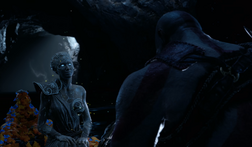
The essence of Athena appeared before Kratos in God of War (2018).
Athena was replaced by the beheaded Mimir as Kratos' ally in knowledge, although she herself appears in astral form facing the Spartan, Kratos, still holding a grudge against her, demands that she get out of his head. Later, as he was retrieving the Blades of Chaos and reusing them once more, she appears outside the door of his house, announcing that he will always be a monster. Accepting this fact, he confirms, but declares that he is no longer her monster. Athena disappears as Kratos walks outside towards her, holding his blades, never to be seen or heard from again.
Personality
Of all the Gods on Mount Olympus in the God of War series, Athena was arguably the least selfish and was in fact, very noble, as was displayed not only by her deep love for her people and her horror of Ares' siege on Athens, but also her deep concern and love for the rest of humanity; as shown in God of War III, she stated that she intended to "liberate" mankind with the power of Hope. She also was seen loving her family - particularly her father, Zeus, deeply, and even sacrificed her own life to save him, although it's possible that she only did so to save the world, as the death of Zeus would have meant the death of Olympus, and thus the destruction of the entire world.
Athena even cared greatly for Kratos: she elevated him as a God, shielded him from Olympus' wrath, guided him on his quest, and remained his closest ally in all of the games. That was possibly due to her knowledge that Kratos was her brother.
But in God of War III, her motives somewhat changed. For some reason, she desired the death of Zeus and motivated Kratos's quest for vengeance. It was possible that she was affected by the evil, Greed, when Kratos opened Pandora's Box, which changed her motives to personal gain. However, she did not show any of that evil in God Of War II while she was alive. She also claimed to have had a message for humanity.
It was unknown what she ultimately had in mind, but it seemed that she wished the destruction of the Olympians so that she could rebuild the world and rule mankind as its sole all-powerful God. Furthermore, according to Erin Torpey, Athena's voice actress for God of War III, she considered Athena as "Trying to do some good to the world, but ultimately wants to take it over," which further lent to the possibility that she was not as benevolent as she presented herself to be.
Power and Abilities
As the Goddess of War and Wisdom, Athena was one of the most powerful gods on Olympus; with a large variety of abilities, she was just as powerful (if not more powerful) as Ares, her rival.
- Astral Projection: After she sacrificed herself for Zeus, Athena was able to return in an Astral Form to guide Kratos. To her account, it also gave her a different outlook on the world and caused her to "finally have seen the truth".
- Immortality: Like all Olympians, Athena was immortal, unable to age or die from natural causes or mortal weapons. Divine weaponry, like Pandora's Box and the Blade of Olympus as well as fellow Olympians, Gods, Titans or Primordials could harm and kill her, however.
- Invulnerable: Like all Olympians, Athena was invulnerable and couldn't be harmed by regular weapons.
- Object Possession: Her favorite method of communicating with her servants and subjects was by taking possession of a statue that represented her. She did that through the series, to guide Kratos.
- Power Bestowing: Athena was able to bestow her servants with incredible power as she was shown to with Kratos, as she gave him the Rage of the Gods. Her greatest feat, however, was granting Kratos the title of God of War, which granted him the powers of a God.
- Power Conjuration: Athena was able to conjure magic, such as the power of Hope. That power was powerful enough that a Demigod and possibly powerful Mortal who held the power, were able to kill powerful Gods. Hope was more powerful than even the evil, Fear. For example, Zeus was the most powerful God of all, and even he was killed by that power.
- Weapon Creation: As the Goddess of War, Athena was able to create incredible weapons of War, when she was alive and when she was in her Astral Form. Those weapons were the Blades of Athena and the Blades of Exile. It was possible that she also crafted the Blade of the Gods as it was found in her city and the blade was held by a statue of her. She also bore two swords on her hips, which she used for fighting
- Flight: She actually showed that ability in her Astral Form, but she probably had that ability when she was alive. Considering the fact that she was able to reach the Summit of Sacrifice, it could be assumed that she truly did have that ability.
- Telekinesis: In the first game, when Kratos attempted to commit suicide, Athena used that ability and placed him on solid ground. Another example was when she lifted Pandora toward Kratos.
- Intangibility: While in Astral Form, Athena was able to phase through objects at will, and could become tangible at will.
- Pyrokinesis: Seeing as how her weapons were imbued with fire and the fact that the God of War had possessed that ability, it was likely that she had pyrokinetic abilities as well.
- Superhuman Strength: As a God, she was far stronger than any Mortal and even stronger than most Demigods. She had shown herself able to block a blow from the Blade of Olympus while Kratos was wielding it and was even able to initially push him back.
- Wisdom: Being the Goddess of Wisdom, she had a high genius level of intelligence. Her extreme intelligence allowed her to be able to do the following: Figure out challenges and puzzles, come up with great ideas and plans, overcome her opponents, figure out questions or not so obvious causes, and guide people. During a fight, most of the time, Athena used her intelligence rather than sheer force (with the exception of her fight with Kratos). In Greek Mythology, Athena always bested Ares in a fight.
- Superhuman Stamina: As a God, she had incredible stamina and could keep fighting without tiring.
- Superhuman Speed: As a God, she possessed a speed that surpassed that of any Mortal and most Demigods. She was however, not as fast as Hermes.
- Shape-shifting: Based on the fact that Kratos assumed that the Eagle that attacked him in Rhodes was Athena (later revealed to be Zeus), it was safe to assume that she was able to take on any form that she saw fit.
Relationships
Zeus
Athena was very devoted to protecting Olympus and her father, Zeus. She was favored by Zeus among the rest of his children, which ignited the jealousy of her brother, Ares. Athena even went as far to protect Zeus from being killed by Kratos, though whether she did that to protect the world or out of genuine love for her father was unknown. Athena died by taking the strike meant for Zeus and the King of the Gods took that opportunity to flee while he showed no emotion for his beloved daughter despite favoring her, but it could be that he had already been corrupted by the evils of Pandora's Box by that point, and his fear of Kratos may have overshadowed any grief for his daughter, however he did show some remorse for her death later on in the series.
After her death, something changed Athena. She claimed to see things where she didn't see before and believed that Mankind would suffer as long as Zeus lived. During the duration of the game, she did everything to help Kratos kill Zeus. Athena never revealed herself to her father, possibly so he would not attempt to stop her or inform Kratos of her questionable intentions.
Kratos
Athena always was the most caring God to Kratos. That stemmed from their first meeting during the Raid on Sparta. As Olympian forces (Centaur Generals), cleared the way for Athena and Ares, they grabbed Deimos. Kratos tried to revolt, but was beaten down by Ares. It was Athena who stopped Ares that day from killing Kratos. She saved the life of her brother and showed regret for what she and Ares had to do. In his 10 years of servitude to the Gods, it was mostly Athena who told Kratos which task was asked of him. During Kratos' journey to the Sisters of Fate, she communicated with him and tried to stop him, but her warnings were ignored by him. It was also interesting to note that Athena knew that Kratos was still alive after Zeus' betrayal when all of the others had believed him to be dead. That showed that she was aware of his capabilities and continued to watch over him even after his dethronement as God of War.
In return, Kratos was shown to care about Athena to a degree, since he was saddened by the fact that he stabbed her when he tried to kill Zeus, in direct contrast to Zeus who showed no emotion over her death, despite favoring Athena and fleeing afterwards. Kratos, on the other hand, was shown to be grieving over the lost of his dying ally (later revealed to be his sister) and asked her the reason for her sacrifice to which she revealed that it was to protect the world. She soon revealed Zeus' relation to Kratos (by extension herself as well), which shocked him as she tried to tell him to abandon his goal of vengeance. But despite Athena's pleas for Kratos to stop his ambition, he ignored her words and went on to state how he would destroy all of the Gods who stood in his way and watched calmly as Athena died.
Later on in God of War III, when confronted by the Astral Form of Athena, Kratos defended his actions stating that the Blade of Olympus was meant for Zeus. He was doubtful about her desire to help him, but later agreed to let her lead him to the flame. She tried to win back his trust and she did at a certain point. In his psyche, Kratos came face to face with his past sins, one of which was forgiving himself for killing Athena, which showed that he was deeply tormented for killing one of the few people (besides his family) who stood by his side no matter what. But, after Athena revealed her true intentions, he felt betrayed once more, which lead to an argument. He eventually repaid her by thwarting her plans by committing suicide and released the power that she craved the most: Hope. She was outraged and proclaimed to the dying Kratos: "You disappoint me, Spartan." She then pulled out the Blade of Olympus, left the area despite the fact that her brother was slowly "dying," and showed no concern for him as she disappeared. Kratos then grinned before he died.
Years later, through her last interaction with Kratos, whom had ended up in the Nordic world, It was concluded that they will never reconcile, her having probably still consumed by the evil of Greed, still distraught by what he had done years earlier, releasing the power of Hope, the elderly Kratos still holding a grudge against her for meddling with his life these past few years.
Ares
Athena's relationship with her brother, Ares, was quite complex. For a while, they seemed to be able to work together as both of them were deployed by Zeus to retrieve Deimos. But even when on a mission for Olympus, they argued. It was Athena who stopped Ares from killing their half-brother during the raid. Zeus favored Athena, Ares felt betrayed, and, as he became estranged from Olympus, grew jealous of her. Ares started his plans to overthrow Olympus, something that he abandoned for a while after the death of The Furies. His jealousy led to him eventually to siege her city, Athens. It was noted that before his attack on her city, she had no intentions of having him killed. But afterwards, she never regretted his death as she considered him a threat to both Athens and Olympus.
The Other Olympians
In the first installments, Athena was quite protective of her fellow Gods and spoke about them with great respect. She asked Kratos to stop angering them by pillaging their cities with his Spartan Army. But it was she who told Kratos, in her dying words, that every Olympian would be willing to put their life down in order to protect Zeus and if he proceeded, they would try to kill him. Due to her words, she actually signed the death warrant of her fellow Gods. In God of War III, she instead helped Kratos as he took out God after God and taught him how to use their weapons. In the end, it was implied that she had wanted them gone, so that she could become the monotheistic ruler of the world.
Trivia
- In God of War and God of War II, Athena was voiced by Carole Ruggier, who also voiced Athena in the video game, Age of Mythology.
- In God of War: Chains of Olympus, God of War: Ghost of Sparta, and God of War III, Athena was voiced by Erin Torpey.
- In God of War II, one of the Bonus Costumes had the player look like Athena, although the voice was still that of Kratos.
- She was the only Goddess who played a major role in all of the games.
- With her death, both the original God and Goddess of War died.
- Athena's weapon of choice were 2 swords, though in Greek Mythology, she used a spear and shield.
- The result of Athena's death was the loss of wisdom for all people. However, as she was associated with wisdom, but was not the source of it, it was considered an abstract concept; it did not imply Mortals suddenly becoming unwise or foolish because of her demise.
- Athena's sacrifice for Zeus had an ironic twist in Greek Mythology: When Athena's mother (the Titaness Metis) was pregnant, Zeus attempted to kill them both out of fear that the child would be the prophesized son who would overthrow him. Later, Zeus attempted to kill Athena again by swallowing her, but she irritated him from within so badly that he called for Hephaestus to crack open his skull and released her. Ironically, this is the same method that Cronos out of fear of being overthrown.
- Athena's death in God of War II was very reminiscent of Lysandra and Calliope's, since Kratos had killed both his family, and Athena, by accident.
- Athena appeared in PlayStation All-Stars Battle Royale as a minion. She was unlocked by levelling up Kratos to Rank 8.
- In Homer's Iliad, she was also called Athenaia, and was also called "Spoilgatherer".
- The color that seems to represent Athena most is green.
- In Kratos' psyche, Athena re-appeared as she's stabbed by Kratos. As he returned to her, she explained that fear had driven Zeus to kill his own father, Cronos. But that was a mistake as Cronos didn't die by the hands of Zeus, but Kratos'; Zeus only wanted to punish Cronos as he sent him to wander the Desert of Lost Souls.
- Concept Art was made for Athena to appear in Ascension, though she was cut from the game.

